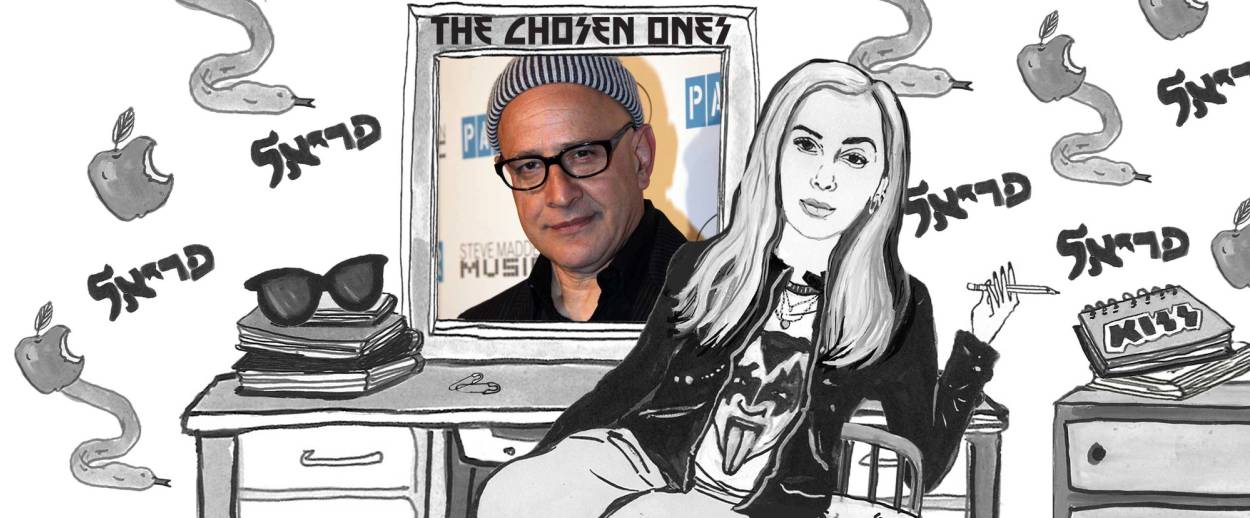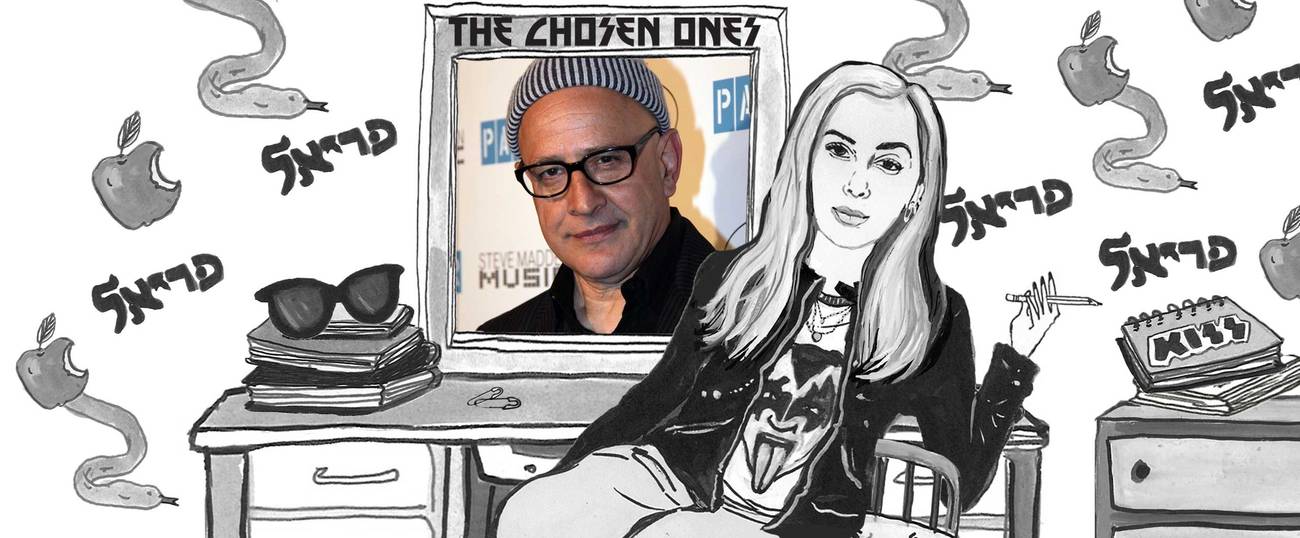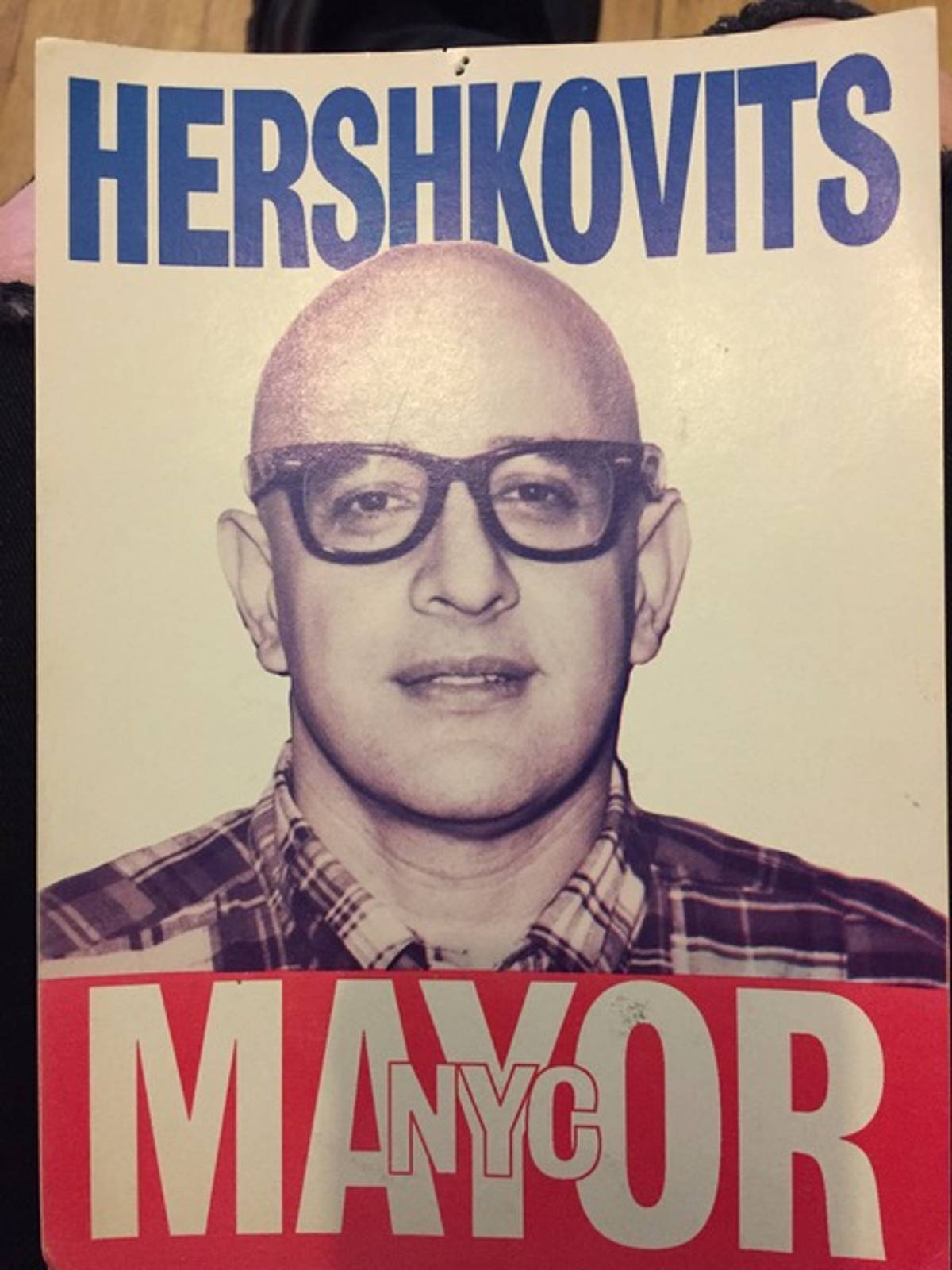The Chosen Ones: An Interview With David Hershkovits
The man behind PAPER magazine on growing up in Brooklyn as a rebellious Yeshiva boy, covering the Sex Pistols, and why he refuses to have two Seders




Editor-in-Chief of Paper Magazine, David Hershkovits, is the definition of cool. He was cool before most people even knew what cool was—even before he did. A Yeshiva boy who grew in Brighton Beach in the 1950s, he used to skip school to play basketball with his public school friends and sneak into Manhattan when the city was basically on fire. Once, he ran for mayor of New York City.
Hershkovits has been defining, and redefining, what’s what for the rest of us since 1984, when he established the iconic PAPER magazine, which began as a black-and-white fold-out poster. Hershkovits has covered everything from Hasids to The Sex Pistols; you may recall PAPER recently broke the Internet when it put Kim Kardashian’s ass and an exploding bottle of champagne on the cover. After that, Hershkovits flew to Israel, where he was born, for the first time in over three decades.
Periel Aschenbrand: Breaking the Internet is pretty impressive.
David Hershkovits: You have no idea. There are hundreds of memes of people making their version of that cover. Of course it’s [was like] the famous Jean Paul Goude photo and it went all over the world and became a global, viral madness and has been, well, like an albatross ever since, because it’s very hard to repeat. But, we’re doing other things.
PA: PAPER has always pushed boundaries. You started PAPER with Kim Hastreiter…
DH: Yes, in 1984. We had met prior to that at Soho News. She was a Style editor and I was a News editor. We got to know each other because we both had an interest in nightlife and going out and meeting creative people. When Soho News folded around 1982, I had the bug to keep doing something but it was a really terrible time in the economy of the city so it didn’t make sense to start anything new. On the other hand, all this fashion world and music and art people were coming up–Keith Haring, Robert Mapplethorpe, Jean Michael Basquiat, amazing talents at their peak. These were all people who we knew and worked with, so we felt like there was a real community.
PA: And it used to be literally, on a piece of paper, right?
DH: Yeah. It was a poster that opened up. And all the advertisers were around the perimeter like a monopoly board, and they were like $250 each.
PA: That’s so brilliant.

DH: When you opened it up, you’d have to hold it like a Torah.
PA: Very nice, very nice.
DH: I slipped that in.
PA: I appreciate that. I’m sure you never could have imagined in 1984 that PAPER, in its original form, would break the Internet. Tell me about how it was when you started.
DH: First of all, there was no Internet back then, though Apple had just launched their first campaign. But in the beginning, it was all freelance and friends and as it evolved, we added more and more people to do a lot of the jobs that I had been doing. And I did every job, including taking out the garbage.
PA: You grew up in New York, is that correct?
DH: I did. But I was born in Israel. My birth certificate is actually from Palestine.
PA: Where were your parents from?
DH: Hungary and Czechoslovakia area. Holocaust survivors.
PA: So you grew up with that narrative.
DH: I’m still living with it. It doesn’t go away, I’m sorry to say. It’s deeply a part of my life, growing up with two traumatized parents and having to understand that. My dad passed away, but my mom is still alive. She lives in Brooklyn and is doing really well.
PA: When did you come to America?
DH: In 1952, when I was 5.
PA: And you didn’t speak English?
DH: Yes, but of course I learned, I had to. I went to Yeshiva of Brighton Beach and then to Yeshiva University.
PA: Were your parents religious?
DH: Orthodox.
PA: And when did you become a rebel?
DH: Probably very early. But I tried; I was a very good student and I loved to study Talmud.
PA: But you always had some punk in your soul?
DH: Yeah, I had this other side, I always wanted to be an “American,” in opposition to my family. Everyone came from Europe and lived that style and had accents. I wanted to hang out in the park and I got into playing basketball with all the public school kids and so I had this kind of split identity. I’d get chased around by my dad for not wearing a yarmulke. Or I’d have to hide on Shabbat. I’d be playing basketball and my grandfather would come to the park and I’d see him and I’d run away to Coney Island to hang out.
PA: Incredible…
DH: They were worried about me hanging with the wrong crowd. Remember, they just came from this Holocaust, this terrible thing, with all these strangers. They didn’t trust anybody. I understand that today, but that’s not what I was thinking back then.
PA: Do you remember coming here?
DH: I remember that we flew, but it was not a direct flight. And we had to switch planes in the middle of the night. And we had no money. You needed to pay to get into the country and we needed a relative to come get us in.
PA: But you wound up going on the right path?
DH: I don’t know, did I?
PA: Well my idea of the right path, isn’t everyone’s…
DH: I went in the direction I needed to go but it was very difficult and I went through periods when I wasn’t in touch with my family.
PA: And then you went to Yeshiva University?
DH: Yes, and I played on the basketball team there.
PA: Oh my God! David! You did?
DH: Yeah, I was like a little Jewish prodigy basketball star.
PA: That’s unbelievable.
DH: But things started to change, in the ’60s with rebellion. And I barely went to any of the classes, which I regret in a way, because there are things I wish I knew, like Hebrew Literature.
PA: It’s not too late. And then?
DH: I went to Penn State and I got my masters graduate degree. And then I went to New Orleans, where I taught English at the University of New Orleans there, which was this whole other wonderful part of my life for six or seven years and I wrote for the local magazines there about film and art and started an art center there. Eventually I quit teaching and came back to New York in 1978.
PA: And the rest is history.
DH: The rest is in Soho News and PAPER magazine. I found a niche for what I love to do. When I got back here my sister had a studio she let me stay in near the Chelsea Hotel. It was one of the low points of my life. I had no job, no prospects, the city was a terrible place–the murder capital, buildings burning… Everything you could think of. But then I discovered the Soho News and they hired me. This editor liked the idea, believe it or not, of this kid from Yeshiva University working for this hip, downtown weekly that was covering a punk scene. The first story I did was cover a show at the Brooklyn Museum–on Hasidic artists.
PA: So you really weren’t that insulated growing up.
DH: I was, but I didn’t want to be so I found the Village Voice and I found foreign films and I read Jonas Mekas, who I actually just interviewed.
PA: That’s incredible.
DH: I really wanted to know about all that stuff. Always. I would sneak out from Brighton Beach and sneak out to Times Square. I would run away to Coney Island. I would always be sort of running away from something there. Anyway, so after that Hasidic story, a few months later, the editor told me had something for me.
I was a news guy–that was why I was hired–and everyone else was an arts writer or did other things. And this was when the Sex Pistols were coming to tour the U.S., which was this legendary tour lasting only six weeks. Sid Vicious and Nancy Spungen moved to New York and she was killed at the Chelsea Hotel and he was accused of the murder.
PA: Whoa.
DH: And I was asked to write the story.
PA: Wow…
DH: And that became my first cover story for the Soho News. And was introduced to this whole underground punk scene that I’ve been obsessed with ever sense.
PA: And your family was totally scandalized?
DH: I don’t know that they even knew anything about it or were connected or relating to it anyway.
PA: That was probably for the best. And you just went back to Israel, for fashion week in the first time in 35 years? You were invited by the government?
DH: Yes. I couldn’t take my eyes off the religious people–not that I don’t see them here, especially in terms of clothing, because they’re so about their clothes but they couldn’t care less about fashion.
PA: Such an interesting way to put it.
DH: I just wonder about all of the religious stuff.
PA: What do you wonder about it?
DH: It saddens me that that’s how it’s gone. To the extent, in Jerusalem, that they have taken over and locked down the city in that way. In the history, that’s not how it started.
PA: It’s not supposed to be like that.
DH: No. My parents were on a kibbutz, my father was in the Independence Day War. I’m sure they weren’t fighting for that.
PA: We need to become more moderate on both sides.
DH: Yes. I think it’s great to have a Jewish country where you are free to be as Jewish as you want but when it gets to be the theocracy vs. democracy, I still would prefer democracy.
PA: Right. And, um, speaking of politics, you ran for mayor?!
DH:I ran for mayor against Rudy Guiliani when he was running for a second term. It was more like a performance piece but I was very involved in a lot of politics, like helping people register, we went out into the clubs–they were big back then, in the ’90s. That’s when Guliani was cracking down on the clubs and his platform was the quality of life and my platform was the quality of nightlife.
PA: That’s uh-mazing.
DH: It was fun.
PA: Speaking of fun. What’s your favorite drink?
DH: Red wine.
PA: How do you eat your eggs?
DH: Scrambled or fried.
PA: How do you drink your coffee?
DH: A little milk. Whole in the morning, skim in the afternoon.
PA: What’s your favorite Jewish Holiday?
DH: The first day of Passover. Not the second. I hate the second Seder. In Israel, there only do one night and I’m claiming that from now on.
PA: You had a bar mitzvah, obviously?
DH: Oh, yeah.
PA: What did you wear?
DH: My dad took me to buy a suit at Barneys.
PA: I would expect nothing less.
DH: The old Barneys. The original Barneys.
PA: Still chic.
DH: It wasn’t so chic then. But it was a step up from S. Klein on the Square.
PA: I guess I won’t ask shampoo you use.
DH: Right.
PA: Lox or gefilte fish?
DH: Lox. But when my mom used to make her own gefilte fish, that was amazing.
PA: Five things in your bag right now?
DH: Like four notebooks and a bunch of pen–each one represents an unfinished project.
PA: Favorite pair of shoes?
DH: My Adidas Ultraboots that my son, who is a sneakerbuff, bought for me for my birthday.
Periel Aschenbrand, a comedian at heart, is the author of On My Kneesand The Only Bush I Trust Is My Own.